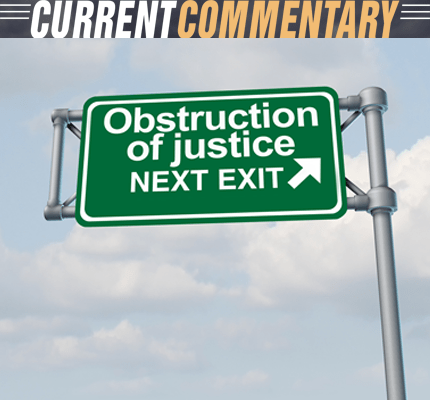
Language is the Key to Holding Trump Accountable
By Rick Cherwitz, Ph.D.
At no time in my career as a professor in Communication has our discipline’s knowledge been more critical to the public at large than today. Applying principles of rhetoric to the nation’s political challenges in 2019 is essential to restoring objectivity in processing the news—which, in turn, is requisite to democratic deliberation.
Allow me to offer the most recent evidence for this claim:
Since the release of special counsel Robert Mueller’s “Report on the Investigation into Russian Interference in the 2016 Presidential Election,” and especially following his televised statement on Wednesday, May 29, Democratic members of Congress have endeavored to walk a fine line.
Some argue that impeaching Donald Trump is demanded given the Constitutional mandate for congressional oversight, as well as the obligation Congress has to provide checks against a President who is ignoring the rule of law.
Others are taking a more measured and calculated position, suggesting that, while investigations into Trump wrongdoing—legal and otherwise—must continue, launching an impeachment inquiry could have unwanted consequences for the Democrats in the 2020 presidential election.
Admittedly, this situation presents a difficult calculus, as well as an enormous rhetorical dilemma.
Might there be another way to navigate this challenge?
On Friday, May 31, Donny Deutsch, a branding and marketing professional and television personality, claimed that rather than calling for an “impeachment” inquiry, congressional Democrats should conduct a “criminal” inquiry. From a rhetorical perspective, this makes sense. As someone who has spent more than four decades studying political language, I find partial merit in Deutsch’s recommendation.
Why?
In 2019 the word “impeachment” has become a highly-charged political term, one that turns off many Americans who must be convinced about the importance of the Mueller report—the content of which they may not be reading. Unlike during Watergate and other episodes in U.S. history, today the term “impeachment” isn’t viewed with the same seriousness; it is now more casually employed.
Moreover, a continued impeachment chorus allows President Trump, as well as his media and political cronies, to continue spinning their narrative about how the Democrats are behaving in a purely politically motivated manner, harassing the President and refusing to move the country forward. Arguably, impeachment rhetoric even bolsters the persuasive force of that narrative.
Perhaps by invoking the language of “criminal” inquiry, the urgency and less partisan nature of the issue can be underscored. Criminality, after all, evokes a very different image than “impeachment”—one to which more people may pay attention, especially those open to persuasion.
In addition, this rhetorical shift might appease those Democrats who believe that not enough is being done, demonstrating to voters that Congress is not abdicating its constitutional duty. At the same time, it might lessen the fear of those who wish to avoid the potential 2020 electoral costs they believe will be caused by incessantly talking about impeachment.
Of course, there are those who will argue that this idea may take impeachment completely off the table. To the contrary—a criminal inquiry might actually be a more effective first step toward impeachment.
My argument about the need for Democrats to change their rhetoric is anchored to research I have conducted about “language-in-use.” In an article in the Quarterly Journal of Speech, I documented that, when speakers employ carefully chosen language, their words often are repeated and then internalized by public opinion leaders. Much like the functioning of an enthymeme, the effect is that the public subconsciously may take on the values and beliefs implied by the words. This is significant rhetorically because it enables the speaker to control the narrative and set the agenda for future debates.
In short, by shifting the language from “impeachment” inquiry to “criminal” inquiry, the Democrats might gain the upper hand in arguments about how to hold President Trump accountable, helping them to escape their current rhetorical dilemma.
Admittedly, Donny Deutsch’s recommendation may not be a silver bullet. But, as I have argued, from a rhetorical perspective, it is worth serious consideration. To be sure, we live in extraordinary times, times when the typical rules governing politics and rhetoric may no longer be applicable.
So, why not give this approach a try?
REFERENCES
Change impeachment to 'criminal activity': Donny Deutsch. May 31, 2019. https://www.msnbc.com/morning-joe/watch/change-impeachment-to-criminal-activity-donny-deutsch-60625989526.
Richard Cherwitz. "The Contributory Effect of Rhetorical Discourse: A Study of Language-in-Use." Quarterly Journal of Speech, 66 (1980), 33-50.
Aristotle. Rhetoric. Trans. W. Rhys Roberts. New York: Modern Library, 1954.


